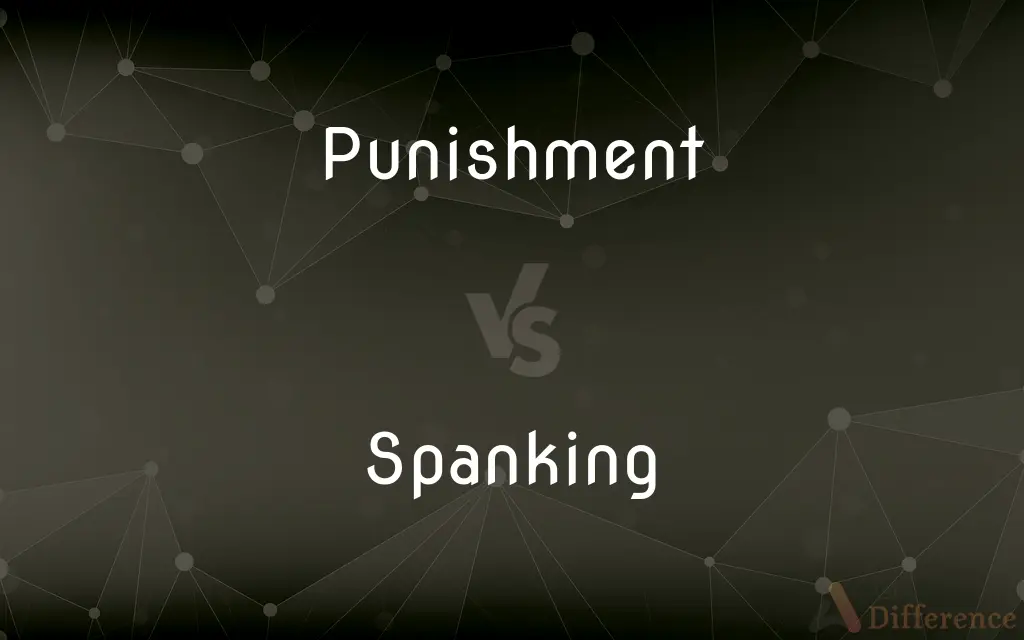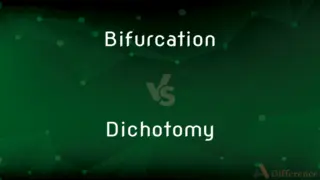Punishment vs. Spanking — What's the Difference?
By Fiza Rafique & Maham Liaqat — Updated on April 6, 2024
Punishment is a broad term for any consequence given in response to unwanted behavior, while spanking is a specific form of physical punishment involving hitting the buttocks.

Difference Between Punishment and Spanking
Table of Contents
ADVERTISEMENT
Key Differences
Punishment encompasses a wide range of actions designed to reduce or eliminate unwanted behavior, based on the principle of deterrence. It can be physical, such as spanking, or non-physical, including time-outs, fines, or the removal of privileges. Spanking, on the other hand, is a specific type of physical punishment that involves striking the buttocks, typically with the open hand, as a response to perceived misbehavior. It's a method often debated in terms of ethics and effectiveness.
While punishment serves as a broader category that includes various disciplinary techniques, spanking is often considered within the context of disciplining children. The effectiveness and moral acceptability of spanking as a form of punishment have been subjects of significant debate among parents, psychologists, and educators. In contrast, punishment, in general, is a widely accepted concept across different contexts, including the legal system, educational settings, and parenting, with the aim of teaching right from wrong.
The goals of punishment are to correct behavior, deter future misbehavior, and teach a lesson. This can be achieved through a variety of means, not limited to physical actions. Spanking, however, is often viewed through a narrower lens, focusing on immediate behavior correction. Critics argue that spanking can lead to negative outcomes, such as increased aggression in children, fear, and damage to the parent-child relationship, whereas proponents may see it as a quick and effective way to address disobedience.
The application of punishment can vary greatly, from verbal reprimands to incarceration, depending on the setting and the severity of the behavior being addressed. The specificity of spanking as a form of punishment lies in its physical nature and the controversy surrounding its use. This controversy stems from differing views on child rearing, the psychological effects of physical punishment on children, and the evolving societal norms regarding the treatment of children.
In discussing punishment and spanking, it's important to consider the broader social and psychological implications. The debate often centers around the effectiveness of spanking in teaching children discipline versus the potential for psychological harm and the promotion of violence as a solution to problems. This contrasts with other forms of punishment that may seek to engage the individual's understanding of their actions and encourage internalization of right and wrong without physical intervention.
ADVERTISEMENT
Comparison Chart
Definition
Consequences given in response to unwanted behavior to discourage its recurrence.
A form of physical punishment involving hitting the buttocks, typically with the open hand.
Types
Physical, verbal, psychological, financial, etc.
Physical (specifically involves hitting).
Purpose
To correct, deter, and educate about unacceptable behaviors.
To immediately address and correct misbehavior.
Applications
Broad, ranging from parenting to legal systems.
Primarily used in parenting and child discipline.
Controversy
Varies by type; some forms are widely accepted, others are debated.
Highly debated, especially concerning ethical and psychological implications.
Effectiveness
Depends on the method, context, and individual circumstances.
Debated; some argue it can be effective in the short term, while others highlight long-term negative effects.
Compare with Definitions
Punishment
Aims to teach a lesson, correct behavior, and prevent future misdeeds.
The purpose of his punishment was to understand the importance of honesty.
Spanking
A disciplinary technique involving hitting the buttocks, usually with an open hand.
They decided against spanking as a form of discipline for their children.
Punishment
A method used to reduce or eliminate undesirable behavior by introducing a consequence.
As a form of punishment, he was grounded for a week without access to video games.
Spanking
Most commonly discussed in relation to disciplining children.
Spanking is a controversial topic in many parenting forums.
Punishment
Applies in various settings, including homes, schools, and the criminal justice system.
The school's punishment for cheating on a test is a failing grade and a call to the parents.
Spanking
Viewed by some as an effective short-term behavior correction method.
He was spanked as a child and believes it taught him discipline.
Punishment
The appropriateness of different forms of punishment varies widely.
Community service is seen as a constructive form of punishment for minor offenses.
Spanking
Criticized for potential long-term negative effects on children.
Studies suggest that spanking may lead to increased aggression in children.
Punishment
Can be non-physical, such as time-outs, fines, or revoking privileges.
For lying, her punishment was an extra chore each day for a week.
Spanking
Societal norms are increasingly moving away from physical forms of discipline.
Many modern parenting guides advise against spanking, suggesting alternative discipline methods.
Punishment
Punishment, commonly, is the imposition of an undesirable or unpleasant outcome upon a group or individual, meted out by an authority—in contexts ranging from child discipline to criminal law—as a response and deterrent to a particular action or behavior that is deemed undesirable or unacceptable. It is, however, possible to distinguish between various different understandings of what punishment is.The reasoning for punishment may be to condition a child to avoid self-endangerment, to impose social conformity (in particular, in the contexts of compulsory education or military discipline), to defend norms, to protect against future harms (in particular, those from violent crime), and to maintain the law—and respect for rule of law—under which the social group is governed.
Spanking
Spanking is a common form of corporal punishment involving the act of striking, with either the palm of the hand or an implement, the buttocks of a person to cause them physical pain. Although the term spanking broadly encompasses the use of either the hand or implement, the use of implements can also refer to the administration of more specific types of corporal punishment such as caning, paddling and slippering.
Punishment
The imposition of a penalty or deprivation for wrongdoing
The swift punishment of all offenders.
Spanking
(Informal) Exceptional of its kind; remarkable.
Punishment
A penalty imposed for wrongdoing
"The severity of the punishment must ... be in keeping with the kind of obligation which has been violated" (Simone Weil).
Spanking
Swift and vigorous
A spanking pace.
Punishment
Rough treatment or use
These old skis have taken a lot of punishment over the years.
Spanking
Brisk and fresh
A spanking breeze.
Punishment
The act or process of punishing, imposing and/or applying a sanction.
The naughty children were given a punishment by their teachers.
Spanking
Used as an intensive
A spanking clean shirt.
Punishment
A penalty to punish wrongdoing, especially for crime.
A light punishment
A harsh punishement
Spanking
A number of slaps on the buttocks delivered in rapid succession, as for punishment.
Punishment
A suffering by pain or loss imposed as retribution
Spanking
Present participle of spank
Punishment
(figuratively) Any harsh treatment or experience; rough handling.
A vehicle that can take a lot of punishment
Spanking
Fast and energetic.
A spanking pace
Punishment
The act of punishing.
Spanking
Brisk and fresh.
A spanking breeze
Punishment
Any pain, suffering, or loss inflicted on a person because of a crime or offense.
I never gave them condign punishment.
The rewards and punishments of another life.
Spanking
An intensifier.
Brand spanking new
A spanking good time
Spanking clean
Spanking white
Punishment
A penalty inflicted by a court of justice on a convicted offender as a just retribution, and incidentally for the purposes of reformation and prevention.
Spanking
A form of physical punishment in which a beating is applied to the buttocks.
Domestic spanking is often endured over the knee (or lap), formal spanking rather applied over a contraption such as a tresle or A-frame, with or without constraints
Punishment
Severe, rough, or disastrous treatment.
Spanking
An incident of such punishment, or such physical act in a non-punitive context, such as a birthday spanking.
Punishment
The act of punishing
Spanking
Moving with a quick, lively pace, or capable of so doing; dashing.
Four spanking grays ready harnessed.
Spanking
Large; considerable.
Spanking
Very; extremely; - used especially in the phrase spanking new or brand spanking new, meaning completely new and unused.
Spanking
The act of slapping on the buttocks;
He gave the brat a good spanking
Spanking
Quick and energetic;
A brisk walk in the park
A lively gait
A merry chase
Traveling at a rattling rate
A snappy pace
A spanking breeze
Common Curiosities
Why is spanking considered controversial?
Spanking is debated due to concerns over its effectiveness and potential for causing fear, increased aggression, and damage to the parent-child relationship.
What is spanking?
Spanking is a form of physical punishment that involves hitting the buttocks, usually as a disciplinary measure for children.
Are all forms of punishment controversial?
Not all, but some forms, particularly physical punishment like spanking, are highly debated regarding their ethical and psychological impacts.
Can spanking affect a child's psychological development?
Research suggests that spanking can have negative effects on a child's psychological development, including increased aggression and anxiety.
What constitutes punishment?
Punishment can be any consequence aimed at reducing unwanted behavior, including physical, verbal, and psychological methods.
Is spanking illegal?
In some countries and states, spanking, especially in schools, is illegal or heavily regulated due to concerns about child welfare and rights.
How do cultural views on spanking differ?
Cultural views vary widely, with some cultures accepting spanking as a traditional disciplinary method, while others strongly oppose it as harmful.
How do societal views on punishment and spanking change?
Societal views evolve with growing understanding of child psychology and human rights, leading to a shift towards non-physical disciplinary methods.
Can punishment be effective without being physical?
Yes, many non-physical forms of punishment, such as time-outs or loss of privileges, are used effectively in various settings.
What are alternatives to spanking?
Alternatives include verbal reprimands, positive reinforcement of good behavior, time-outs, and setting clear and consistent rules.
Share Your Discovery

Previous Comparison
Winsome vs. Handsome
Next Comparison
Bifurcation vs. DichotomyAuthor Spotlight
Written by
Fiza RafiqueFiza Rafique is a skilled content writer at AskDifference.com, where she meticulously refines and enhances written pieces. Drawing from her vast editorial expertise, Fiza ensures clarity, accuracy, and precision in every article. Passionate about language, she continually seeks to elevate the quality of content for readers worldwide.
Co-written by
Maham Liaqat













































